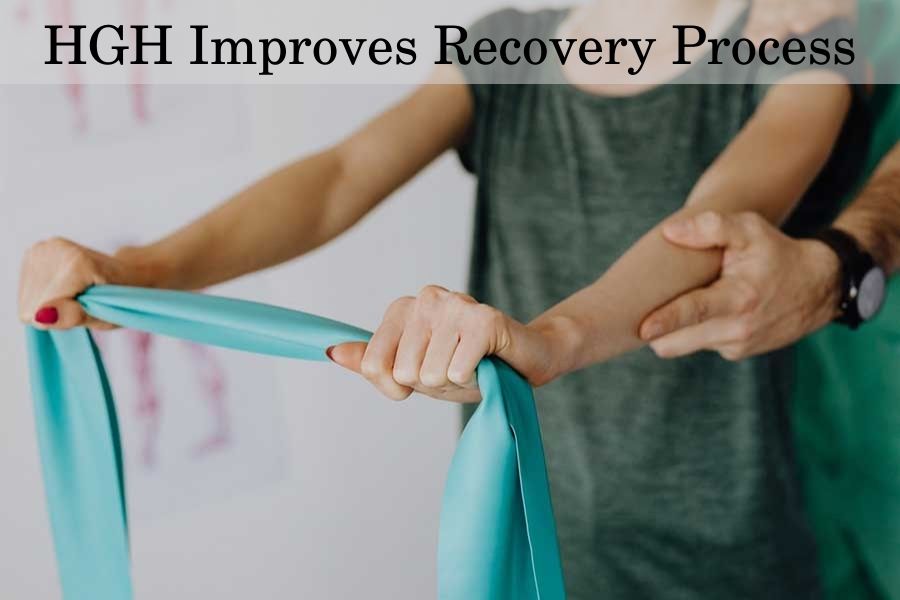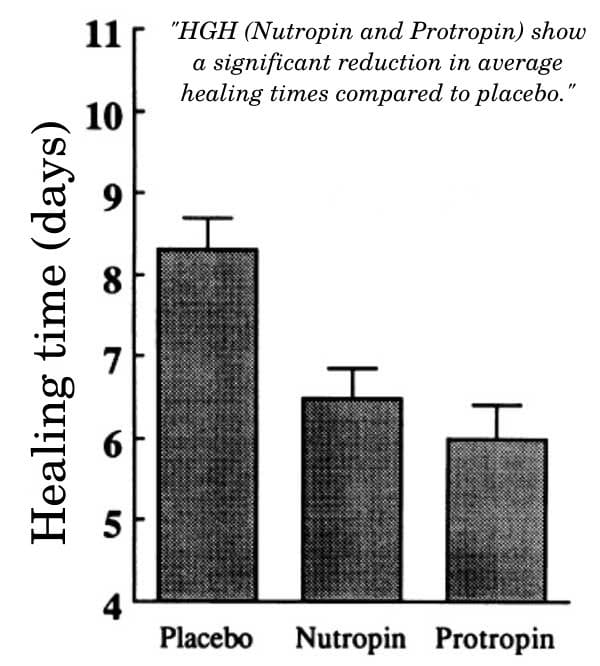Adults with GHD are more likely to experience slower recovery after an injury, disease, or medical interventions such as surgery. This prolongs the rehabilitation process and increases the risk for long-term disability.
What is more, conditions that require prolonged bed rest or immobilization are more likely to cause muscular atrophy and wasting.
If you have GHD, then it is important to manage your condition properly via growth hormone replacement therapy. The treatment can restore the normal hormonal balance in your body and improve recovery.
In addition, patients with GHD who have a legal HGH prescription can consult with their doctors and temporarily increase their dosage to further boost their recovery after a traumatic event.
Always seek advice from your physician before making changes to your therapy as in some cases increasing your dosage can do more harm than good.
HGH treatment improves the recovery process
HGH stimulates the production of insulin-like growth factor 1 (IGF-1) in most tissues and organs inside your body. IGF-1 is an anabolic mediator that speeds up growth and development by stimulating cell proliferation.
This cellular process also plays a central role in the recovery of most tissues and organs.
In order to support the healing process in GHD, you will need to take growth hormone injections. So far, HGH therapy has shown benefits in recovery after wounds, surgery, and injuries.
For example, the treatment has been shown to decrease the loss of muscle mass, postoperative fatigue, and the risk of infection in patients undergoing surgeries that required prolonged bed rest.
Scientists also report that growth hormone therapy was able to speed up rehabilitation after orthopedic surgeries that required immobilization, thanks to its muscle-sparing effects.
Due to its benefits for cell proliferation and the formation of collagen which is the main protein in your skin, HGH injections have been tested on patients with severe skin burns. In one trial the therapy led to a 25% quicker recovery and shorter hospital stay.
The benefits of collagen production may also help speed up recovery after tendon injuries. In another trial, HGH therapy led to an almost 4-fold increase in tendon collagen production in healthy individuals.
Currently, scientists are also investigating the potential of HGH for aiding the recovery process after neurological and organ damage.
In one small study, HGH therapy helped patients with complete spinal transection to recover some of the sensory perceptions they lost due to the injury. In another experiment, HGH injections helped speed up the regeneration of liver tissue in mice.
In addition, HGH therapy may help reduce hypersensitivity to pain, improve mood and increase the quality of your sleep. Ultimately, these HGH benefits lead to improved quality of life in GHD patients.
How long does it take for HGH to speed up recovery?
The timeline of HGH benefits for the recovery of different tissues depends on the dose. Larger amounts of HGH lead to faster recovery but in general, your dose should not exceed 3-5 mg (9-15 IU) per day for up to 2-3 weeks.
Higher and/or longer exposure should be avoided as it can increase the risk of side effects.
Once an injury is recovered, the effects of the therapy are permanent. Yet, patients with GHD should continue taking HGH therapy in doses recommended by their doctors in order to manage their symptoms and maintain recovery capacity in case of future injuries.
What else do you get with improved healing?
Better healing capacity can help you recover faster from injuries and reduce your risk of suffering long-term disability in case of an accident or trauma.
This will allow you to remain healthy and physically active even at an advanced age. Being physically active reduces your risk for a wide range of diseases including obesity, cardiovascular problems, diabetes, cancer, arthritis, etc.
In addition, you will recover faster from sports activity and physical exercise.
Get a free consultation with our medical expert for any questions about hormone replacement therapy


